14 start with K start with K
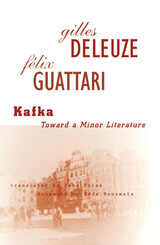
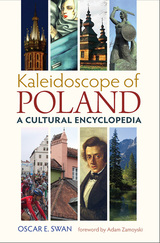
Kaleidoscope of Poland is a highly readable volume containing short articles on major personalities, places, events, and accomplishments from the thousand-year record of Polish history and culture. Featuring approximately 900 compact text entries and 600 illustrations, it will be a handy reference at home, a perfect supplement to traditional guide books when traveling, an aid to language study, or simply browsed with enjoyment from cover to cover by anyone with an interest in Poland.
The entries describe essential features of Poland from the mundane to the sublime. Whether it is bagels or the Bug River, Chopin or Madame Curie, the authors offer colorful and often witty snapshots of significant individuals, customs, folklore, historic events, phrases, places, geography, and much, much more. Beginning with the emergence of the Polish state in 966 under Mieszko I, to the resurrection of present-day Poland within the European Union, it’s also a sweeping account of the tumult and triumphs the nation has witnessed through much of its history.
This highly entertaining yet informative book is essentially a “cultural dictionary”—offering a knowledge base that can be referred to time and time again. Kaleidoscope of Poland will be welcomed by readers of Polish descent, students of Polish, or anyone planning to visit Poland—anyone seeking a greater insight into this fascinating land.

From Kant to Kierkegaard, from Hegel to Heidegger, continental philosophers have indelibly shaped the trajectory of Western thought since the eighteenth century. Although much has been written about these monumental thinkers, students and scholars lack a definitive guide to the entire scope of the continental tradition. The most comprehensive reference work to date, this eight-volume History of Continental Philosophy will both encapsulate the subject and reorient our understanding of it. Beginning with an overview of Kant’s philosophy and its initial reception, the History traces the evolution of continental philosophy through major figures as well as movements such as existentialism, phenomenology, hermeneutics, and poststructuralism. The final volume outlines the current state of the field, bringing the work of both historical and modern thinkers to bear on such contemporary topics as feminism, globalization, and the environment. Throughout, the volumes examine important philosophical figures and developments in their historical, political, and cultural contexts.
The first reference of its kind, A History of Continental Philosophy has been written and edited by internationally recognized experts with a commitment to explaining complex thinkers, texts, and movements in rigorous yet jargon-free essays suitable for both undergraduates and seasoned specialists. These volumes also elucidate ongoing debates about the nature of continental and analytic philosophy, surveying the distinctive, sometimes overlapping characteristics and approaches of each tradition. Featuring helpful overviews of major topics and plotting road maps to their underlying contexts, A History of Continental Philosophy is destined to be the resource of first and last resort for students and scholars alike.
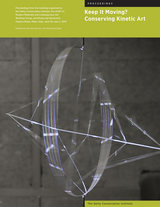
Professionals responsible for conserving contemporary art are in the midst of rethinking the concept of authenticity and solving the dichotomy often felt between original materials and functionality of the work of art. The contrast is especially acute with kinetic art when a compromise between the two often seems impossible. Also to be considered are issues of technological obsolescence and the fact that an artist’s chosen technology often carries with it strong sociological and historical information and meanings.
The free online edition of this open-access book is available at www.getty.edu/publications/keepitmoving/ and includes zoomable figures and videos. Also available are free PDF, EPUB, and Kindle/MOBI downloads of the book.
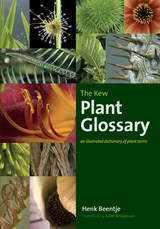
This accessible, comprehensive glossary covers all the descriptive terms for plants that one is likely to encounter in botanical writing, including everything from magazine articles to plant field guides, scientific papers, and monographs. An essential companion, it presents 3,600 botanical terms, accompanied by full definitions and detailed illustrations to aid in identification, all laid out in a clear, easy-to-use fashion. It will be indispensable for plant scientists, conservationists, horticulturists, gardeners, writers, and anyone working with plant descriptions, plant identification keys, floras, or field guides.

Daily political events and the steady inevitability of globalism require that informed students and citizens learn something about religious traditions foreign to their own. Designed for both classroom and general use, these handy Key Words guidebooks are essential resources for those who want clear and concise explanations of common terms and unfamiliar concepts of major world religions.
Each pocket-sized volume contains definitions for over 400 terms from religious principles and significant periods to noteworthy figures.
A quick sampling of terms from this volume:
BodhisattvaBhavanaJaramaranaKalachakraMalaMantraNirvanaSamadhiZen
Sample Definitions:
Brahma Viharas: The four sublime states of loving kindness, compassion, sympathetic joy, and evenness of mind achieved by the practice of bhavana (see bhavana, metta, karuna, mudita, upekkha).
Jaramarana: Old age and death. The final link in the causal chain of existence which arises from jati or birth. The Buddha left his palace to search for enlightenment after experiencing the shock of seeing old age, sickness and death (see jati, Siddharta Gotma,. nidanas, samsara).

Daily political events and the steady inevitability of globalism require that informed students and citizens learn something about religious traditions foreign to their own. Designed for both classroom and general use, these handy Key Words guidebooks are essential resources for those who want clear and concise explanations of common terms and unfamiliar concepts of major world religions.
Each pocket-sized volume contains definitions for over 400 terms from religious principles and significant periods to noteworthy figures.
A quick sampling of terms from this volume:
AscensionBeatificationCatechismEvangelicalHumanae vitaeLast SupperMartyrRepentanceSermon on the Mount
Sample Definitions:
Catechism The manual of Christian doctrine in a questions and answer format generally associated with teaching those preparing for Confirmation (see Confirmation).
Sermon on the Mount The famous discourse of Jesus described in Chapter 5 of Matthew's gospel which provides the basis of Christian ethics (see Beatitudes, Lord's Prayer).

Daily political events and the steady inevitability of globalism require that informed students and citizens learn something about religious traditions foreign to their own. Designed for both classroom and general use, these handy Key Words guidebooks are essential resources for those who want clear and concise explanations of common terms and unfamiliar concepts of major world religions.
Each pocket-sized volume contains definitions for over 400 terms from religious principles and significant periods to noteworthy figures.
A quick sampling of terms from this volume:
AshramBrahmanDharmaGyanaJanmashtamiKalpaMantraRamayanaUpanishads
Sample Definitions:
Ashram Lit. shelter. A retreat place or hermitage used for spiritual development and often the centre of teaching for a particular guru or sect.
Gyana Spiritual knowledge. Sometimes it is understood that such knowledge can be learned by the study of scriptures but it is also used to describe knowledge that arises from direct experience of God (Brahman) or realization of the Self (atman). The relationship between these two informs different theories concerning spiritual knowledge (see Vedanta, atman, Brahman, jnana).

Daily political events and the steady inevitability of globalism require that informed students and citizens learn something about religious traditions foreign to their own. Designed for both classroom and general use, these handy Key Words guidebooks are essential resources for those who want clear and concise explanations of common terms and unfamiliar concepts of major world religions.
Each pocket-sized volume contains definitions for over 400 terms from religious principles and significant periods to noteworthy figures.
A quick sampling of terms from this volume:
AhwalDa'waHajjIzzatMadrasaRamadanShari'aWatanZakat
Sample Definitions:
Izzat (Urdu) The concept of honour or family pride. Izzat functions as an eclectic mixture of Islamic codes and local customs which the family members are expected to observe. Non-observance leads to disgrace for the individual and the family.
Ramadan/Ramazan (U) The ninth month of the Muslim year which is observed as a fast lasting from sunrise to sunset. The fast is one of the five pillars of Islam and during this period Muslims should abstain from food, water and sexual activity. The fast is commanded by Allah in the Qur'an and is therefore obligatory for all adult Muslims except in special circumstances such as illness or menstruation. In such circumstances it is permissible to make up the period of the fast at a later date. The period of Ramadan includes some of the holiest occasions of the Muslim year such as the Night of Power that marks the first revelation of the Qur'an to Muhammad. The fast ends with the festival of Eid al-Fitr. The month of Ramadan is a period of extra religious sensitivity and many Muslims who are not usually observant will attend the mosque and perform their prayers five times a day. The fast provides an opportunity to reflect on religious matters and pass a month in prayer but is also considered to be a means of creating empathy for the poor and needy in the community (see itikaf, Eid al-Fitr, Laylat ul-Qadr).

Daily political events and the steady inevitability of globalism require that informed students and citizens learn something about religious traditions foreign to their own. Designed for both classroom and general use, these handy Key Words guidebooks are essential resources for those who want clear and concise explanations of common terms and unfamiliar concepts of major world religions.
Each pocket-sized volume contains definitions for over 400 terms from religious principles and significant periods to noteworthy figures.
A quick sampling of terms from this volume:
BeritEmunahHarosetKaddishMezzuzahRosh HashanahShabatYeshivaZionism
Sample Definitions:
Emunah Lit. Faith. The foundation of the Jewish tradition, it essentially refers to trust in God and reliance on Him to guide the people perfectly. If a person trusts completely in God, everything else will fall into place.
Yeshiva/Yeshivah A college for the study of Torah and Talmud. Although Jewish males had always engaged in study of the Torah under the guidance of their Rabbis, in the nineteenth century, organized colleges appeared in eastern Europe which allowed progression through the various stages of study. Secular study was not permitted and some students spent a lifetime in study of Torah, Talmud and Halakhah (see Torah, Talmud, Halakhah).

Daily political events and the steady inevitability of globalism require that informed students and citizens learn something about religious traditions foreign to their own. Designed for both classroom and general use, these handy Key Words guidebooks are essential resources for those who want clear and concise explanations of common terms and unfamiliar concepts of major world religions.
Each pocket-sized volume contains definitions for over 400 terms from religious principles and significant periods to noteworthy figures.
A quick sampling of terms from this volume:
AgnosticismCanonExegesisGraceLiberation TheologyMonotheismParableRitualTheocracy
Sample Definitions:
Exegesis The process of explaining a sacred text in order to penetrate further into the author's meaning or to apply new interpretations based upon contemporary situations or enhanced knowledge (see hermeneutics, sacred texts).
Monotheism The worship of one God regarded as the sole and universal creator of the universe, typically expressed in the religions of Judaism, Islam and Christianity. However varieties of monotheism can also be found in Indian traditions. Monotheistic beliefs classically assert that such a deity is personal, caring for and involving itself in the affairs of human beings through revelation (see deism, monism, henotheism, polytheism, revelation).
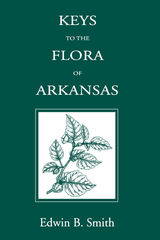
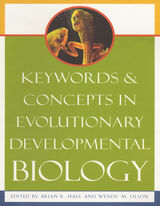
The new field of evolutionary developmental biology is one of the most exciting areas of contemporary biology. The fundamental principle of evolutionary developmental biology ("evo-devo") is that evolution acts through inherited changes in the development of the organism. "Evo-devo" is not merely a fusion of the fields of developmental and evolutionary biology, the grafting of a developmental perspective onto evolutionary biology, or the incorporation of an evolutionary perspective into developmental biology. Evo-devo strives for a unification of genomic, developmental, organismal, population, and natural selection approaches to evolutionary change. It draws from development, evolution, paleontology, ecology, and molecular and systematic biology, but has its own set of questions, approaches, and methods.
Keywords and Concepts in Evolutionary Developmental Biology is the first comprehensive reference work for this expanding field. Covering more than fifty central terms and concepts in entries written by leading experts, Keywords offers an overview of all that is embraced by this new subdiscipline of biology, providing the core insights and ideas that show how embryonic development relates to life-history evolution, adaptation, and responses to and integration with environmental factors.

King of the Cowboys, Queen of the West presents these two celebrities in the most comprehensive and inclusive account to date. Part narrative, part reference, this impeccably researched, highly accessible survey spans the entire scope of Rogers's and Evans's careers, illuminating and celebrating their place in twentieth-century American popular culture. Following the pair through each stage of their professional and personal trajectories, author Raymond E. White explores the unique alchemy of the singing cowboy and his free-spirited yet feminine partner. In a dual biography, he shows how Rogers and Evans carefully husbanded their public image and—of particular note—incorporated their Christian faith into their performances. And in a series of exhaustive appendixes, he documents their contributions to each medium they worked in. Testifying to both the breadth and the longevity of their careers, the book includes radio logs, discographies, filmographies, and comicographies that will delight historians and collectors alike. With its engaging tone and meticulous research, King of the Cowboys, Queen of the West is bound to become the definitive source on the lives of these two great American icons.
READERS
Browse our collection.
PUBLISHERS
See BiblioVault's publisher services.
STUDENT SERVICES
Files for college accessibility offices.
UChicago Accessibility Resources
home | accessibility | search | about | contact us
BiblioVault ® 2001 - 2024
The University of Chicago Press









